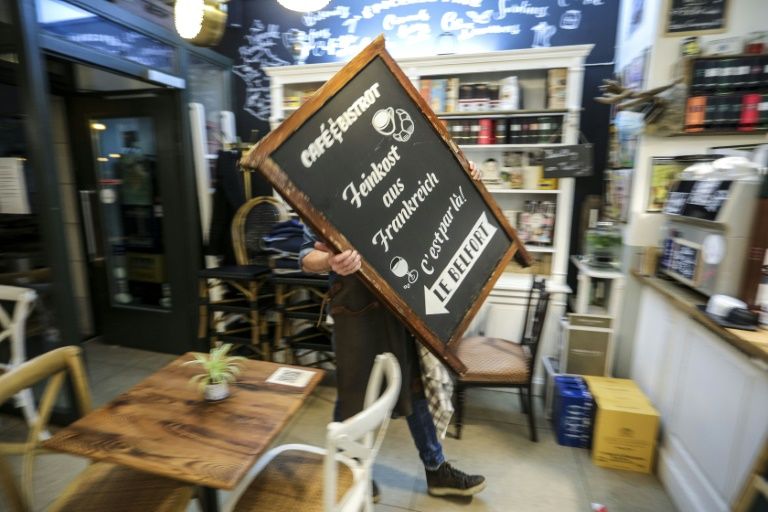Europe imposes new virus curbs as anger and frustration swell
Berlin (AFP) – Germany on Monday led a tightening of coronavirus restrictions in Europe that have triggered frustration and anger, while the Covid-19 crisis deepened in the United States on election eve.
The virus has infected over 46 million people worldwide, with more than 1.2 million deaths, and the acute outbreaks in Europe and America are sparking further alarm about the state of the already devastated global economy.
To curb the spike in Germany, Europe’s biggest economy, Chancellor Angela Merkel has ordered a round of shutdowns from Monday until the end of the month.
Germans will not be confined to their homes, but bars, cafes and restaurants must close, as well as theatres, operas and cinemas.
New restrictions are expected to be unveiled in Belgium, which has the world’s highest number of Covid-19 cases per capita, and in Italy, the first country in Europe to impose a lockdown during the firsd wave.
Portugal and Austria have announced partial or full lockdowns to start this week, while France imposed its second shutdown last week and is preparing to tighten it further although schools are largely spared this time.
– Hospital warning –
Authorities in the Swiss canton of Geneva said they would close bars, restaurants and non-essential businesses from Monday night. And hospitals there warned that surging emergency cases may force them to decide to admit one Covid-19 patient over another if his or her chances of survival are better.
Now in its second wave in Europe after emerging in China in December last year, the pandemic has discriminated against no individual or country, albeit hitting some harder than others.
In Britain, the media reported that Prince William, second-in-line to the British throne, contracted coronavirus in April but kept his diagnosis secret, with one tabloid saying “he didn’t want to alarm the nation”.
The head of the World Health Organization said he was self-quarantining after someone he had been in contact with tested positive.
“I am well and without symptoms but will self-quarantine over the coming days, in line with @WHO protocols, and work from home,” Tedros Adhanom Ghebreyesus tweeted, stressing the importance of complying with coronavirus guidance.
– Vandalism and looting –
But Nigel Farage, the driving force behind Brexit, was set to relaunch his political party as “Reform UK”, with a main focus to oppose the government’s coronavirus lockdowns.
England is preparing for fresh stay-at-home orders to come into force from Thursday, following warnings that hospitals could be overwhelmed within weeks.
The frustration over the economic and social cost of lockdowns has led to protests in many parts of the world, especially Europe, with some leading to violent skirmishes.
Protesters in several Spanish cities clashed with security forces for a third night Sunday, with vandalism and looting breaking out in some parts.
Spain has already imposed a nighttime curfew, and almost all its regions have implemented border closures to prevent long-distance travel.
Violence has also erupted in several Italian cities as well as the Czech capital Prague.
– ‘Financial Armageddon’ –
There are fears that many businesses could go under, with Michael Kill, CEO of the Night Time Industries Association in the UK, which lobbies for the entertainment and hospitality sector, saying firms faced “financial Armageddon”.
Irish no-frills airline Ryanair said it sank into the red in the first half of its financial year due to the virus fallout.
The health situation is also deteriorating in the United States, which is gearing up for the election showdown between President Donald Trump and his Democratic rival Joe Biden on Tuesday.
It is the worst-affected country in the world with 9.2 million infections and nearly 231,000 deaths, and the pandemic has been front and centre during the bitter election campaign.
With cases surging again, experts have warned of more devastation.
In Mexico, parades were cancelled and cemeteries closed on Sunday during the Day of the Dead festival, in which people normally deck their homes, streets and relatives’ graves with flowers, candles and colourful skulls.
Many remembered those who have passed in the privacy of their homes, as authorities urged people to avoid gatherings.
Janet Burgos decorated an altar with confetti, fruit and a photograph of her mother Rosa Maria, who died in June aged 64 from suspected Covid-19.
“Now I begin to see what the Day of the Dead really represents,” she said.
burs-lc/txw
Disclaimer: Validity of the above story is for 7 Days from original date of publishing. Source: AFP.


